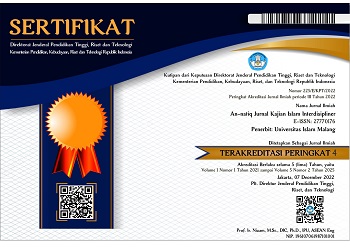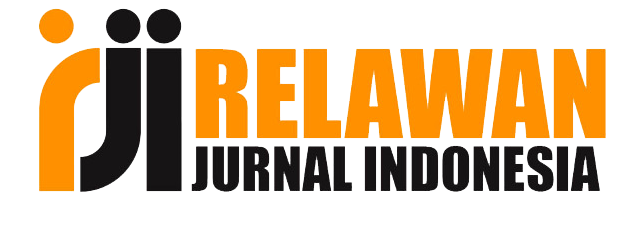THE INSECURE VIRUS CONTAMINATION TO TERRORISM IN SOCIETY 5.0 IN INDONESIA’S DIGITAL SPACE
DOI:
https://doi.org/10.33474/an-natiq.v3i1.18985Keywords:
Contamination, Digital Media, Insecurity, Terrorism, IndonesiaAbstract
The transformation of conventional mass media into digital has had an impact on human life in all aspects of life, especially patterns of thinking and social practices. Ironically, the public is not yet fully aware of the potential threats posed by digital media. The process of migrating to digital media makes the virtual world lose depth and accuracy in digesting accurate and accountable information. Mental health and terrorism are a small number of diseases that colonize and inhabit the digital world as if preparing to infect its users. This research uses a qualitative approach with a literature study model. The main data sources were obtained from fifty reputable national and international scientific journals and books. Meanwhile, supporting data was obtained from various digital and social media platforms, such as YouTube, websites belonging to the government of the Republic of Indonesia and the private sector, and social media popular among people in the industrial era 5.0. This article examines in more depth how digital media has contaminated its users on a psychological aspect and has become a symptom of an acute social illness. This study concludes that among the forms of digital media disease are acute internet addiction, cybercrime, pornography-sexual crimes, cyberbullying, ignoring others, FOMO, living without a society, culture without privacy, noise in silence, nervous, liking to show off, thirst for appreciation, like sensation-controversy, to radicalism-terrorism.
References
Abdel-Salam, Doaa M., Hajar I. Alrowaili, Haifa K. Albedaiwi, Amnah I. Alessa, and Hanan A. Alfayyadh. 2019. “Prevalence of Internet Addiction and Its Associated Factors among Female Students at Jouf University, Saudi Arabia.” Journal of the Egyptian Public Health Association 94(1):1–8. doi: 10.1186/s42506-019-0009-6.
Abdel-Salam, Doaa M., Hajar I. Alrowaili, Haifa K. Albedaiwi, Amnah I. Alessa, and Hanan A. Alfayyadh. 2019. “Prevalence of Internet Addiction and Its Associated Factors among Female Students at Jouf University, Saudi Arabia.” Journal of the Egyptian Public Health Association 94(1):1–8. doi: 10.1186/s42506-019-0009-6.
Ahyar, Muzayyin, and Alfitri Alfitri. 2019. “Aksi Bela Islam: Islamic Clicktivism and the New Authority of Religious Propaganda in the Millennial Age in Indonesia.” Indonesian Journal of Islam and Muslim Societies 9(1):1. doi: 10.18326/ijims.v9i1.1-29.
Alam, Aniqa, Robert Biddle, and Elizabeth Stobert. 2021. “Emics and Etics of Usable Security: Culturally-Specific or Culturally-Universal? BT - HCI for Cybersecurity, Privacy and Trust.” Pp. 22–40 in, edited by A. Moallem. Cham: Springer International Publishing.
Asshiddiqie, Jimly. 2021. “Jurnal Konstitusi Dan Demokrasi Memperkenalkan Peradilan Etika.” 1(1).
Cransac-Miet, Amélie, Marianne Zeller, Frédéric Chagué, Agnès Soudry Faure, Florence Bichat, Nicolas Danchin, Mathieu Boulin, and Yves Cottin. 2021. “Impact of COVID-19 Lockdown on Lifestyle Adherence in Stay-at-Home Patients with Chronic Coronary Syndromes: Towards a Time Bomb.” International Journal of Cardiology 323:285–87. doi: https://doi.org/10.1016/j.ijcard.2020.08.094.
Daulay, Nurussakinah. 2021. “Home Education for Children with Autism Spectrum Disorder during the COVID-19 Pandemic: Indonesian Mothers Experience.” Research in Developmental Disabilities 114:103954. doi: https://doi.org/10.1016/j.ridd.2021.103954.
Dedaj, But, Gokcen Ogruk-Maz, Mjellma Carabregu-Vokshi, Luljeta Aliu-Mulaj, and Khalid M. Kisswani. 2022. “Improving ICTs (Mobile Phone and Internet) for Environmental Sustainability in the Western Balkan Countries.” Energies 15(11):1–13. doi: 10.3390/en15114111.
Dinata, Hartinah, Program Studi, Magister Psikologi, Fakultas Psikologi, and Universitas Tarumanagara. 2021. “Pengaruh Kecemasan Terhadap Problematic Internet Use Dengan Prokrastinasi Akademik Sebagai Variabel Mediator Mahasiswa Pada Masa Pandemi COVID-19.”
Dzardanova, Elena, Vlasios Kasapakis, Damianos Gavalas, and Stella Sylaiou. 2022. “Virtual Reality as a Communication Medium: A Comparative Study of Forced Compliance in Virtual Reality versus Physical World.” Virtual Reality 26(2):737–57. doi: 10.1007/s10055-021-00564-9.
Eddy, Triono, and Onny Medaline. 2020. “Strengthening The Right To Freedom Of Opinion On The Fundamental And Constitutional Rights Of Social Media Users Based On Collaboration Of The 1945 Constitution And The Uu Ite In Indonesia.” 2072–77.
Eddy, Triono, and Onny Medaline. 2022. “Behavior Of Social Media Users In Strengthening The Right To Freedom Of Thought And Basic Rights Of Social Media Users Based On Cooperation In The 1945 Constitution And The Ite Law In Indonesia.” 6(10):2739–47.
Et. al., Dr. Priya Dwivedi ,. 2021. “Maslow Theory Revisited-Covid-19 - Lockdown Impact on Consumer Behaviour.” Turkish Journal of Computer and Mathematics Education (TURCOMAT) 12(2):2445–50. doi: 10.17762/turcomat.v12i2.2072.
Fakhruroji, Moch. 2019. “Maintaining Indonesian Muslim Identity through Islamic Study Groups.” Komunitas: International Journal of Indonesian Society and Culture 11(1):75–84. doi: 10.15294/komunitas.v11i1.16950.
Giumetti, Gary W., and Robin M. Kowalski. 2016. “Cyberbullying Matters: Examining the Incremental Impact of Cyberbullying On Outcomes Over and Above Traditional Bullying in North America BT - Cyberbullying Across the Globe: Gender, Family, and Mental Health.” Pp. 117–30 in, edited by R. Navarro, S. Yubero, and E. Larrañaga. Cham: Springer International Publishing.
Gloria, Nocera. 2022. “Zurich University of Applied Sciences ZHAW School of Management and Law Fintech Revolution and Traditional Banks : What Factors Influence Members of Generation Z to Place Their Trust in Fintech Companies , Specifically Neobanks , over Traditional Banks as Banking and Financial Service Providers ? A Case Study on the Banking Application of the Swiss Neobank Yuh.”
Grantz, Kyra H., Hannah R. Meredith, Derek A. T. Cummings, C. Jessica E. Metcalf, Bryan T. Grenfell, John R. Giles, Shruti Mehta, Sunil Solomon, Alain Labrique, Nishant Kishore, Caroline O. Buckee, and Amy Wesolowski. 2020. “The Use of Mobile Phone Data to Inform Analysis of COVID-19 Pandemic Epidemiology.” Nature Communications 11(1):1–8. doi: 10.1038/s41467-020-18190-5.
Guttman, Nurit, and Eimi Lev. 2021. “Ethical Issues in COVID-19 Communication to Mitigate the Pandemic: Dilemmas and Practical Implications.” Health Communication 36(1):116–23. doi: 10.1080/10410236.2020.1847439.
Hadianti, Siti. 2021. Menyiapkan Guru Masa Depan: Sebuah Perspektif.
Haramain, Muhammad, Hannani, St Aminah, Abdullah Thahir, Muliati Muliati, and Muhammad Jufri. 2022. “The Contestation of Religious Radicalism Discourses by Indonesian Muslim Netizens.” The Seybold Report Journal 17(7):674–782. doi: 10.5281/zenodo.6901124.
Hardhienata, Soewarto, Yudhie Suchyadi, and Dian Wulandari. 2021. “Strengthening Technological Literacy in Junior High School Teachers in the Industrial Revolution Era 4.0.” Jhss (Journal of Humanities and Social Studies) 5(3):330–35. doi: 10.33751/jhss.v5i3.4220.
Hu, Guangwei, Sohail Raza Chohan, and Jianxia Liu. 2022. “Does IoT Service Orchestration in Public Services Enrich the Citizens’ Perceived Value of Digital Society?” Asian Journal of Technology Innovation 30(1):217–43. doi: 10.1080/19761597.2020.1865824.
Irwin-Rogers, Keir. 2019. “Illicit Drug Markets, Consumer Capitalism and the Rise of Social Media: A Toxic Trap for Young People.” Critical Criminology 27(4):591–610. doi: 10.1007/s10612-019-09476-2.
Ivanov, Dmitry, and Alexandre Dolgui. 2021. “A Digital Supply Chain Twin for Managing the Disruption Risks and Resilience in the Era of Industry 4.0.” Production Planning & Control 32(9):775–88. doi: 10.1080/09537287.2020.1768450.
Kastolani. 2020. “Understanding The Delivery of Islamophobic Hate Speech Via Social Media In Indonesia.” Indonesian Journal of Islam and Muslim Societies 10(2):247–70. doi: 10.18326/IJIMS.V10I2.247-270.
Kim, Ju Oak. 2021. “BTS as Method: A Counter-Hegemonic Culture in the Network Society.” Media, Culture and Society 43(6):1061–77. doi: 10.1177/0163443720986029.
Kristiyanti, D. A., Normah, and A. H. Umam. 2019. “Prediction of Indonesia Presidential Election Results for the 2019-2024 Period Using Twitter Sentiment Analysis.” Pp. 36–42 in 2019 5th International Conference on New Media Studies (CONMEDIA).
Lassere, Monique, and Jess M. Whyte. 2021. “Balancing Care and Authenticity in Digital Collections.” Journal of Critical Library and Information Studies 3(2). doi: 10.24242/jclis.v3i2.125.ISSN.
Lawrance, Emma L., Rhiannon Thompson, Jessica Newberry Le Vay, Lisa Page, and Neil Jennings. 2022. “The Impact of Climate Change on Mental Health and Emotional Wellbeing: A Narrative Review of Current Evidence, and Its Implications.” International Review of Psychiatry 34(5):443–98. doi: 10.1080/09540261.2022.2128725.
Looi, Jiemin, Deena Kemp, and Yong Whi Greg Song. 2022. “Instagram Influencers in Health Communication: Examining the Roles of Influencer Tier and Message Construal in COVID-19-Prevention Public Service Announcements.” Journal of Interactive Advertising 1–19. doi: 10.1080/15252019.2022.2140316.
Ludigdo, Unti, and Ali Mashuri. 2021. “Negative Evaluations of National Ethics and Its Impact on Islamic Radicalism.” SAGE Open 11(3). doi: 10.1177/21582440211041099.
Mathrani, Anuradha, Tarushikha Sarvesh, and Rahila Umer. 2022. “Digital Divide Framework: Online Learning in Developing Countries during the COVID-19 Lockdown.” Globalisation, Societies and Education 20(5):625–40. doi: 10.1080/14767724.2021.1981253.
Nesher Shoshan, Hadar, and Wilken Wehrt. 2022. “Understanding ‘Zoom Fatigue’: A Mixed-Method Approach.” Applied Psychology 71(3):827–52. doi: 10.1111/apps.12360.
O’Neill, Brenda, and Larry Stapleton. 2022. “Digital Cultural Heritage Standards: From Silo to Semantic Web.” AI & SOCIETY 37(3):891–903. doi: 10.1007/s00146-021-01371-1.
Obar, Jonathan A., and Anne Oeldorf-Hirsch. 2020. “The Biggest Lie on the Internet: Ignoring the Privacy Policies and Terms of Service Policies of Social Networking Services.” Information, Communication & Society 23(1):128–47. doi: 10.1080/1369118X.2018.1486870.
Paterson, Thomas. 2019. “Indonesian Cyberspace Expansion: A Double-Edged Sword.” Journal of Cyber Policy 4(2):216–34. doi: 10.1080/23738871.2019.1627476.
Purnama, Sigit, Agus Wibowo, Bagus Shandy Narmaditya, Qonitah Faizatul Fitriyah, and Hafidh Aziz. 2022. “Do Parenting Styles and Religious Beliefs Matter for Child Behavioral Problem? The Mediating Role of Digital Literacy.” Heliyon 8(6):e09788. doi: https://doi.org/10.1016/j.heliyon.2022.e09788.
Puspita, Indah, Karlisa Priandana, Medria Kusuma Dewi, Peter John Morley, Auzi Asfarian, and Husin Alatas. 2021. “Pembangunan Model Jaringan Saraf Tiruan Untuk Memprediksi Kecenderungan Tipe Mediasi Orang Tua Terhadap Penggunaan Internet Oleh Anak Building an Artificial Neural Network Model to Predict the Tendency of Parental Mediation Types on Internet Use by Childr.” 9:47–57.
Rahardja, Untung, Ninda Lutfiani, and Hega Lutfilah Juniar. 2019. “Scientific Publication Management Transformation In Disruption Era.” Aptisi Transactions on Management (ATM) 3(2):109–18. doi: 10.33050/atm.v3i2.1008.
Rai, I. Nyoman Aji Suadhana, Dudy Heryadi, and Asep Kamaluddin N. 2022. “The Role of Indonesia to Create Security and Resilience in Cyber Spaces [Peran Indonesia Dalam Membentuk Keamanan Dan Ketahanan Di Ruang Siber].” Jurnal Politica Dinamika Masalah Politik Dalam Negeri Dan Hubungan Internasional 13(1):43–66. doi: 10.22212/jp.v13i1.2641.
Rajendram, Rajkumar, Ghulam Abbas Kharal, Naveed Mahmood, Rishi Puri, and Mubashar Kharal. 2020. “Rethinking the Respiratory Paradigm of COVID-19: A ‘Hole’ in the Argument.” Intensive Care Medicine 46(7):1496–97. doi: 10.1007/s00134-020-06102-6.
Rindzevičiūtė, Eglė. 2022. “AI, a Wicked Problem for Cultural Policy? Pre-Empting Controversy and the Crisis of Cultural Participation.” International Journal of Cultural Policy 28(7):829–44. doi: 10.1080/10286632.2022.2137151.
Roqib, Moh., and Suparjo. 2020. “The Role of Teacher in Counteracting the Transnational Religious Ideology of Khilafah.” 436:828–33. doi: 10.2991/assehr.k.200529.175.
Saavedra, Carlo Miguel C., and Reynaldo A. Bautista. 2020. “Are You ‘in’ or Are You ‘out’?: Impact of FoMO (Fear of Missing out) on Generation Z’s Masstige-Brand Apparel Consumption.” Asia-Pacific Social Science Review 20(2):106–18. doi: 10.13140/RG.2.2.12864.76804.
Siegfried, John, and David Colander. 2022. “What Does Critical Thinking Mean in Teaching Economics?: The Big and the Little of It.” The Journal of Economic Education 53(1):71–84. doi: 10.1080/00220485.2021.2004278.
Tanaya, Farra Shalma, Adrian E. Rompis, and Laina Rafianti. 2022. “Legal Studies Regarding Pornography On Live Streaming Through Social Media In The Era Of Digital Disruption.” Jurnal Legalitas 15(1):15–39. doi: 10.33756/jelta.v15i1.13920.
Viola, Hasna Anugerah, and Achmad Room Fitrianto. 2022. “Perilaku Panic Buying Dan Resiliensi Dalam Menghadapi Krisis Pandemi Covid-19.” Jurnal Socius: Journal of Sociology Research and Education 9(1):12. doi: 10.24036/scs.v9i1.383.
Wang, Zi-Liang, Marc N. Potenza, Kun-Ru Song, Xiao-Yi Fang, Lu Liu, Shan-Shan Ma, Cui-Cui Xia, Jing Lan, Yuan-Wei Yao, and Jin-Tao Zhang. 2022. “Neural Classification of Internet Gaming Disorder and Prediction of Treatment Response Using a Cue-Reactivity FMRI Task in Young Men.” Journal of Psychiatric Research 145:309–16. doi: https://doi.org/10.1016/j.jpsychires.2020.11.014.
Downloads
Published
How to Cite
Issue
Section
License
Copyright (c) 2023 An-natiq Jurnal Kajian Islam Interdisipliner

This work is licensed under a Creative Commons Attribution-NonCommercial-ShareAlike 4.0 International License.


























